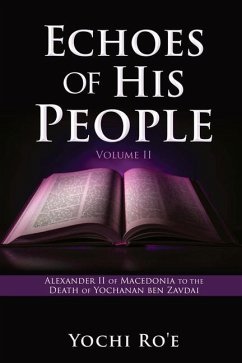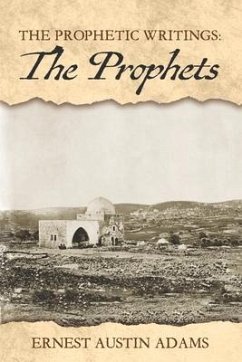
The Death of the Gileadite Girl
Contemporary Readings of Biblical Texts
Versandkostenfrei!
Versandfertig in über 4 Wochen
10,99 €
inkl. MwSt.

PAYBACK Punkte
5 °P sammeln!
In the twelve Bible stories examined here, two goals are apparent. First they are considered with respect for the language of the text. Second, the Biblical text is considered open to a multitude of interpretations. There is NO infallible reader. The Biblical texts are as open to the close reading of moderns as they were to those who established the Biblical canon in ancient times. These modern readings are not privileged in any way, but the conclusions they reach suggest that we have not yet exhausted the meanings of the Bible as it is given. As an example, Jephthah, one of the "judges" of Is...
In the twelve Bible stories examined here, two goals are apparent. First they are considered with respect for the language of the text. Second, the Biblical text is considered open to a multitude of interpretations. There is NO infallible reader. The Biblical texts are as open to the close reading of moderns as they were to those who established the Biblical canon in ancient times. These modern readings are not privileged in any way, but the conclusions they reach suggest that we have not yet exhausted the meanings of the Bible as it is given. As an example, Jephthah, one of the "judges" of Israel is often thought to be the hero of his own story because he was determined to keep his promise to God-- even though it involved the sacrifice of his own beloved daughter; yet here, and consistently with the text, the anonymous Gileadite girl herself is read to be the real hero of Judges 11. If the Bible can still render fresh readings, then "doctrine," which represents itself as the final word on the meanings of the Bible, must surrender its authority over the text of scripture, and "doctrinaire" readings must be considered as some among multitudes of interpretive possibilities. THE DEATH OF THE GILEADITE GIRL invites believers and non-believers, seekers, people of any faith, skeptics, the devout and the profane to look at the Biblical stories anew. How can people of faith respond to the honest observation that prayers are sometimes not answered? What can modern readers make of Mother Mary's admission that Jesus might really be crazy? Is male dominance less deeply entrenched in the Biblical text than generations have thought? Is the Bible a liberating more than a confining text? Is it true that there are no contradictions in the Bible? Jesus usually tells people that their "faith" has saved them; why does he tell a putative prostitute that her love (not his) has saved her? What makes a sacred text sacred? Can other holy books (there are many) also yield new possibilities to close reading?












